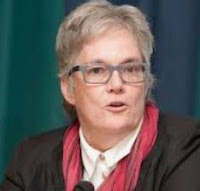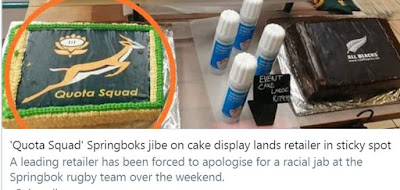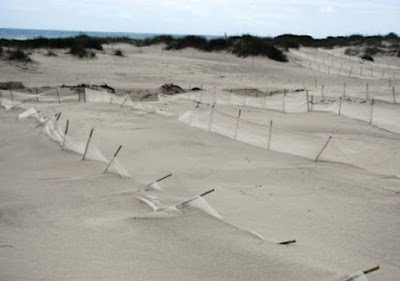Did you know that large sections of our press are running their
own protection racket unhindered by the Press Ombudsman or anybody else? And a
Judge, who is currently heading a media ethics inquiry, is not prepared to consider this decay in our newspaper morality.
The inquiry has been established by the South African National Editor’s Forum (SANEF) and the Judge’s treatment of my submission does nothing
to support SANEF’s claim that it is there to “fight for the highest standards
of ethics in the media.”
The papers involved are the Daily Sun and the free People’s
Post community weeklies in the Media24 stable as well as Caxton's The Citizen daily.
Even Professor George Claassen Media24’s
own Ombudsman had nothing good to say about the Herbalist advertisements that appear in his
Group’s papers. "I agree with you, many of these ads are totally
misleading and even fraudulent,” he said.
Steven Motale the Editor of The Citizen at the time I wrote my story also agreed that the ads were not believable.
Steven Motale the Editor of The Citizen at the time I wrote my story also agreed that the ads were not believable.
They have people claiming to be doctors, professors and the
like who can win you the lotto, enlarge your penis and do all kinds of other
amazing things, almost over night. Some even offer a 100% guarantee.
Of course its illegal to call yourself a doctor when you are not one, but the papers don't worry about that. All they are interested in is making money. In the 17 May 2019 edition of the Sun there were two pages of these ads with 10 advertisers claiming to be doctors.
Of course its illegal to call yourself a doctor when you are not one, but the papers don't worry about that. All they are interested in is making money. In the 17 May 2019 edition of the Sun there were two pages of these ads with 10 advertisers claiming to be doctors.
As I knew the Press Ombudsman did not deal with advertising,
another aspect of my campaign to stop these papers lying daily occurred to me. This
was the editorial side of these, something this Ombudsman is
definitely mandated to deal with, as she is there to rule on complaints against print and on-line publications. So I contacted Pippa Green, who became the
new Ombudsman a couple of months ago.
“I realise that your office does not deal with
advertising,” I began. “But this is about the immoral way certain newspapers
give crooks, who advertise in their papers, editorial immunity from having
their activities exposed in their editorial sides.
 |
| This is typical of the Herbalist ads that appear in the Daily Sun |
“At the same time a host of other dubious characters, who
don’t advertise, get their comeuppance in the same papers.”
My complaint, she told me, first had to go to the Public
Advocate Joe Latakgomo. A former newspaper editor he was given this job last
year to champion the complaints of members of the public, because one of the
issues raised at a press commission was that the public’s voice was not being
heard.
The irony was that way back in 2011, when I was campaigning
to get the Sunday Times to stop
carrying get-rich-quick ads that promised unrealistic returns on investments,
he was the internal Ombudsman for the Avusa Group, the owners of that paper. I
upset him by suggesting that he was a lame duck ombudsman.
An article he wrote in the paper, prompted I believe by my
complaints, was headed Beware of dubious
advertising claims. It looked as though the paper was finally going to stop
aiding crooks.
“These come-ons,” Joe told readers, “eroded the public's
trust in newspapers and false advertising, or advertising that makes claims
that are patently exaggerated, impact on consumer confidence.”
He then gave this assurance, “We will continue as
journalists to expose those who cheat and lie to our readers.” Nothing happened
and it took several more years of my campaigning before the paper stopped
taking this kind of ad. I’m sure it would never concede that my blog had
anything to do with this change of policy. It did however have one lapse last
year.
Joe left the Group not long afterwards and as far as I
know it has not had an internal Ombudsman since. It has changed hands several
times in the last few years.
I told Pippa that I did not think Joe was the right person
to deal with my complaint in view of my dealings with him when he was with
Avusa and she replied: “I cannot breach the Complaints Procedure by leapfrogging
the Public Advocate in the first instance.”
Guest what: she evidently did exactly that because I never
heard from Joe and she effectively kicked my gripe into touch.
She conveniently ignored what I wrote about the editorial
side of these papers, even though this is the part of them that is the reason
for her existence. “We do not at the moment have the jurisdiction to deal with
advertising,” she told me.
 |
| Judge Satchwell |
Retired High Court Judge Kathleen Satchwell, who is heading
the SANEF Inquiry with two retired journalists, took much the same view of what
I had put to Pippa. She too completely ignored the editorial aspect.
In
my email to her I stated: “The gist of my submission is the immoral way certain
South African newspapers have for years been aiding and abetting crooks to rip
off those, who can usually least afford it, by carrying their advertisements
that are clearly fraudulent. This media cancer has been compounded by the
papers giving the shysters editorial immunity from having their activities
exposed in their editorial sides.”
She replied saying: “We consider that your concerns as to
‘fraudulent’ advertising falls beyond our remit. We have no powers to
investigate criminal behaviour, which the connotation of ‘fraud’ certainly
encompasses.”
Her last statement was absurd as nowhere in my 13 page submission did I so much as suggest that they should investigate the fraudulent advertisements. It’s patently obvious that this is not something the Inquiry could be expected to do.
Her last statement was absurd as nowhere in my 13 page submission did I so much as suggest that they should investigate the fraudulent advertisements. It’s patently obvious that this is not something the Inquiry could be expected to do.
I told her that in her reply to me Pippa Green wrote that
they had another complaint from a man who lost a lot of money by responding to
an ad in a community paper for a Profit. “We wrote to the editor of that
paper,” Pippa continued, “and she has undertaken to help the police investigation
and to speak to their advertising department about the type of advertising they
accept.”
So once
again somebody was ripped off with the help of the dubious side of the South Africa
I pointed out that Pippa Green did concede, however that:
“We agree that many advertisements are problematic and undermine the
credibility of newspapers. But we only have the tools of persuasion at the
moment rather than instruction because we do not have jurisdiction over ads per
se.”
She added that the Press Council’s Executive Director
Latiefa Mobara had met with the new head of the Advertising Regulatory Board
CEO Gail Schimmel, “who is also aware of the problem of misleading ads.
“Will continue working with her and speak to editors to see
what we can solve, but in the meantime, the ARB is the body to deal with such
complaints.”
The ARB replaced the Advertising Standards Authority (ASA)
that was so bad it was liquidated. When I complained to the ASA about misleading
newspaper ads I got the complete run around. I was told they did not have the
power to tell papers to stop carrying these, as they could only deal with the individual
advertisers. They wanted me to submit a separate complaint for each ad that I
believed was not kosher. And I don’t
expect the ARB to be any different.
At one stage the ASA stated it had ruled against Herbalist advertisements "on numerous occasions, and it is hoped that the appropriate authorities will address this issue as it is no doubt causing harm to the credibility of legitimate healers and practitioners and this industry at large." As usual nothing happened.
At one stage the ASA stated it had ruled against Herbalist advertisements "on numerous occasions, and it is hoped that the appropriate authorities will address this issue as it is no doubt causing harm to the credibility of legitimate healers and practitioners and this industry at large." As usual nothing happened.
 |
| Former Sunday Times Consumer columnist |
These advertising authorities, like the Press Council (the
Ombudsman is part of this) were established and financed by the industries they
serve, so their impartiality is very questionable when it comes to dealing with
complaints. What’s more they only have a tenuous control over those advertising
agencies and media groups that are their members. They are essentially there to
protect their masters, who pay for them and to give the illusion that they are
looking after the interests of the public.
I ended my submission with: “It’s
not surprising that newspapers go on printing the kind of lies I have referred
to because the Press Council has little or no power to effectively police the
press in South Africa. As the Independent
Media (It owns papers like the Cape Times, The Star in Johannesburg and various others) showed, if a newspaper
group doesn’t like Press Council decisions that go against it, all it has to do
is resign as a member. It then has a free rein to go on doing whatever it likes
or in this case appoint its own internal ombudsman.
You can’t get more absurd than having a
Press Ombudsman, who concedes that the kind of advertisements I have referred
to “undermines the credibility of newspapers,” but, conveniently, she hasn’t been given the power
to do anything about them.
The terms of reference for the Inquiry that the Judge is heading state that its purpose “Shall include: Investigation of ethical breaches on the part of the media industry in South Africa and those obstacles to accountable and credible media practice.”
The terms of reference for the Inquiry that the Judge is heading state that its purpose “Shall include: Investigation of ethical breaches on the part of the media industry in South Africa and those obstacles to accountable and credible media practice.”
Well if ever there was an obstacle to
“credible media practice” it was the Judge’s decision to refuse to consider my
submission.
Regards
Jon, the self appointed Poor Man’s Press
Ombudsman.
See also (sunday times at it again; lies lies and more lies &
sunday times will never expose this)
See also (sunday times at it again; lies lies and more lies &
sunday times will never expose this)
P.S. I wasn’t optimistic that my submission
to the SANEF Inquiry would get beyond first base. But if you don’t try you
never know. SANEF represents editors and senior newspapers journalists and
other people in the media. So I could hardly expect my views to be taken
seriously because, if they were, the papers concerned might have to do without
a good slice of their income. In my one man, 10 year long campaign to stop
papers from continuing to print what are obviously money making lies I sent
emails to SANEF’s director at the time Mathatu Tsedu, as well as the current
director Kate Skinner to try to get them to do something about this. I
didn’t even get a reply.
P.P.S. The two journalists with the Judge on the panel are described as being 'retired from the industry.' They are Nikiwe Bikitsha and Rich Mkhondo. In an email to Nikiwe I told her I presumed this was done to emphasise their independence. But if Google is up to date she is the founder and CEO of Amargi Media and Rich also has his own public relations company. From what I know about public relations firms, keeping in with the press is very much part of what they do when they want to get maximum exposure for their clients. So people who are still in this business can never be described as being 'independent,' if they form part of a panel that is investigating newspaper and journalistic ethics, even if they were once journalists of some kind and have since moved on into the public relations world. Some might argue that even journalists, who are retired and are in no business at all, can't be described as 'independent' when heading an inquiry of this kind. I sent this to her on 21 July and on 24 July I emailed her again saying that if I did not hear from her by the week-end (27 July) I would assume that everything in this email was was correct. I heard nothing from her, although she was
the person who acknowledged the receipt of my submission.
P.P.S. The two journalists with the Judge on the panel are described as being 'retired from the industry.' They are Nikiwe Bikitsha and Rich Mkhondo. In an email to Nikiwe I told her I presumed this was done to emphasise their independence. But if Google is up to date she is the founder and CEO of Amargi Media and Rich also has his own public relations company. From what I know about public relations firms, keeping in with the press is very much part of what they do when they want to get maximum exposure for their clients. So people who are still in this business can never be described as being 'independent,' if they form part of a panel that is investigating newspaper and journalistic ethics, even if they were once journalists of some kind and have since moved on into the public relations world. Some might argue that even journalists, who are retired and are in no business at all, can't be described as 'independent' when heading an inquiry of this kind. I sent this to her on 21 July and on 24 July I emailed her again saying that if I did not hear from her by the week-end (27 July) I would assume that everything in this email was was correct. I heard nothing from her, although she was
the person who acknowledged the receipt of my submission.
















